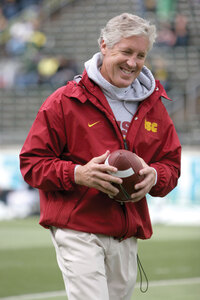‘Always Compete’ shows new side of Carroll
If you were asked to name the most prominent figure on the USC campus, you probably wouldn’t think twice.
This is no knock on long-tenured professors, school deans and university presidents, but USC coach Pete Carroll is the face of not only the illustrious football program, but of the entire university.

Winning philosophy · Writer Steve Bisheff gets to the core of what makes USC’s football team so successful: Pete Carroll’s competitiveness. - Dieuwertje Kast | Daily Trojan
He is the ultimate symbol of success, the epitome of hard work and dedication, and a modern-day legend who transformed himself from a last-resort head coaching candidate in 2000 to this decade’s most prolific collegiate coach.
While Carroll’s tenure at USC can be summed up with staggering numbers, rarely have Trojan fans, alumni or even the casual enthusiasts had the opportunity to understand the man beyond the on-field fame.
Steve Bisheff, a USC alumnus and sports writer for the Los Angeles Times was given exclusive access to the well-oiled machine that is the Trojan football program. Over the course of the 2008-2009 campaign, Bisheff was treated to an experience that featured everything from summer meetings to locker room celebrations, to one-on-one interviews with Carroll.
With this access, Bisheff wrote Always Compete, whose title is based on Carroll’s 2007 banquet speech. Always Compete not only chronicled the 2009 Rose Bowl championship team, but allowed readers into the complex mind of the “ultimate competitor,” Carroll himself.
On the surface, Always Compete, which hit bookstores this past September, looks like the typical thrilling season recap of a team’s search for the often elusive championship a la Jim Dent’s Resurrection: The Miracle Season that Saved Notre Dame, or Jack McCallum’s Seven Seconds or Less.
And while the outer tale of Bisheff’s story revolves around the trials and tribulations of the Trojans’ season, what makes this book a must-read are the core chapters of the story, known as “Pete Profiles.”
These candid sections shed light on the activist, the family man, the free spirit and the unique motivator that makes Carroll “the most revered sports personality in Los Angeles along with Kobe Bryant.”
Although Bisheff’s book pays tribute to Carroll, his national powerhouse football team and his non-profit organization, A Better LA, Bisheff emphasizes that “this is not a cheerleading book gushing about the coach.”
“I tried to write it as an objective journalist in the third person and it addresses what many see as Carroll’s faults,” Bisheff writes.
Although many consider Carroll’s short tenure at USC on par with some of the game’s greatest leaders, including Bear Bryant, Woody Hayes (who Carroll had the privilege of meeting in 1979 while on the Ohio State coaching staff) and Joe Paterno, the book’s most compelling profile, “No, He’s Not Perfect,” stresses Bisheff’s message that his piece doesn’t solely celebrate the competitive nature of the highly decorated coach.
Throughout the chapter, Carroll’s deficiencies are put under the spotlight, and the author expertly humanizes a man who, by the standards of the Trojan faithful, may be closer to a god-like figure than your everyday college football head coach.
From detailed explanations about Carroll’s inability to win against lesser conference foes to his style — which, at times is overly controlling — that tumultuously forced out offensive mastermind Norm Chow, this “Pete Profile” reveals a side to Carroll that packed crowds inside the Coliseum couldn’t comprehend by watching his weekly dominance on the gridiron.
After covering the coach throughout a full season, Bisheff admits that each and every second of Carroll’s life is a competition within itself.
“He’ll compete at anything, including a pickup basketball game or how many Mountain Dews he can drink in his office,” Bisheff writes.
While anecdotal stories preaching Carroll’s eccentric competitive nature are prevalent throughout the book, it is Bisheff’s knack for interweaving these insightful stories with the coach’s touching relationships with family, players, coaches and alumni that make the underlying story even more compelling than the actual blow-by-blow account of the 2008 season.
The book is a must-read, not because it is synonymous with a perennial Pac-10 championship team or because its central figure is a living legend who continues to etch his mark into university lore each Saturday.
Rather, it is the poignant and at times humbling lens through which Bisheff depicts all parties involved that makes Always Compete a rare treat for readers.
Although Bisheff says there are no life lessons or profound teachings that stand out in the book, his 237-page account of a year inside the USC football program is an instantly gratifying experience that everyone can relate to.
From the proud father to the community organizer, and from the top recruiter to the awe-inspiring coach, Always Compete doesn’t miss a beat with its factual, humorous and yet heartfelt portrayal of USC’s most recognizable employee. In doing so, the book promotes Carroll, flaws and all, not only as a local hero but as a national icon.
